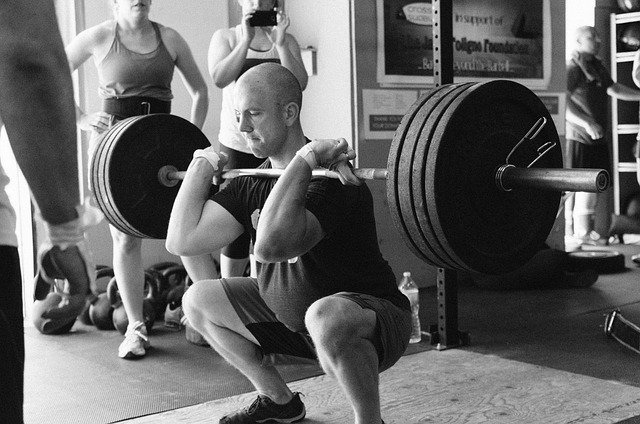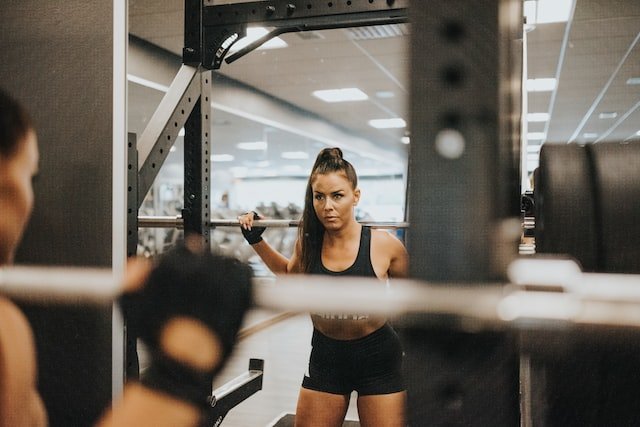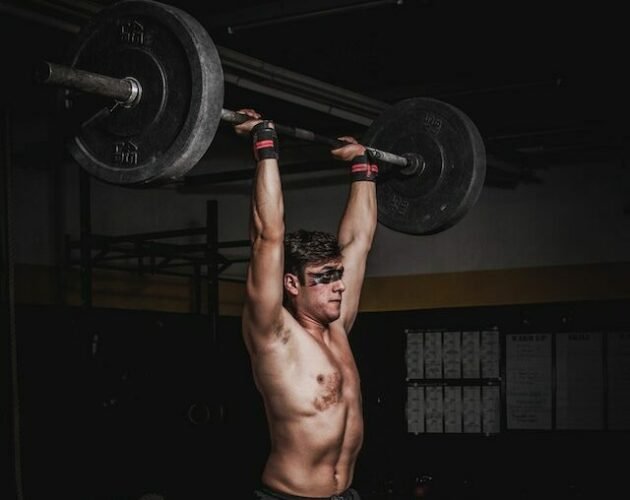
Why Do Squats Feel Like Cardio? Everything You Need To Know
I’m sure you’re familiar with that feeling – the one where you finish a tough set of squats and feel like you’ve just completed an intense cardio workout.
Surprisingly, this isn’t just your imagination – squats really can get your heart rate up!
In this post, we’ll take a closer look at why squats are seen as a cardio workout, and explain why they are so effective when it comes to getting your heart rate up.
So, if you’re interested in learning more about why squats feel like cardio keep reading.
Why do squats feel like cardio?
When you perform squats, your body is using large muscle groups to lift a considerable amount of weight – leading to an elevated heartbeat. As the intensity of the exercise increases, your heart rate will rise further and you’ll start to feel a burn. This is because squats require anaerobic energy. Anaerobic energy comes from your body converting sugar into Adenosine triphosphate (ATP) without oxygen. This is the type of energy used for short, high-intensity activities like sprinting and lifting weights. When you do squats, your body is using more oxygen than it can take in with each breath, creating an oxygen deficit. This type of activity requires a high level of energy expenditure, which is why you feel like it’s a cardio-like exercise. Similarly. many people tend to hold their breath when doing squats, which is another reason why they can feel like cardio, as your heart rate increases due to the lack of oxygen. You need to make sure you breathe correctly when doing squats – in through your nose and out through your mouth, to reduce any potential problems. This can be especially dangerous because it causes an even greater oxygen deficit, leading to a higher heart rate and greater fatigue. In addition, performing squats can help you build strength and muscle, leading to an increase in your metabolic rate even when you’re not actively working out. This can help you burn more calories and fat even when you’re just sitting at home. So technically speaking, squats are not cardio but they induce a similar effect on your body.
Let’s now look at the reasons why squats can feel like cardio…
Large muscle groups
Squats involve the use of large muscle groups like your glutes, quads and hamstrings. When using these muscles together, you are creating a large amount of tension and resistance, which can cause your heart rate to increase.
Although these are the primary muscle groups used in the exercise, other muscles like your calves, abs, and lower back are also engaged. This further increases the intensity of the exercise and gets your heart pumping more.
If you are doing bicep curls or shoulder presses, you will not create the same level of intensity as when doing squats. This is why squats are often seen as a more demanding exercise and will get your heart rate up faster.
So all things considered, when you perform squats your body is using a lot of energy and working multiple muscle groups – leading to an elevated heart rate and the feeling of having done a cardio workout.
Anaerobic energy expenditure
As mentioned, squats require anaerobic energy. This is the type of energy your body uses when there isn’t enough oxygen available to create aerobic energy, which is typically used for steady-state, low-intensity activities such as jogging or cycling.
When you do squats, your body is using more oxygen than it can take in with each breath, creating an oxygen deficit. This type of activity requires a high level of energy expenditure which is why you feel like it’s a cardio-like exercise.
It is important to remember that although squats can feel like cardio, they are still primarily a strength training exercise.
This means it is important to focus on form and technique when performing the exercise, as incorrect form can lead to injury. The same goes for any exercise…make sure you know what you are doing and stay safe!
Another important factor to consider is to make sure you fuel your body with enough energy to be able to perform squats safely and effectively. Eating a balanced diet and taking in adequate amounts of protein, carbohydrates, and fat will help to ensure your body has the fuel it needs for a successful workout.

Elevated heartbeat
When you perform squats your body is using large muscle groups to lift a considerable amount of weight. This leads to an elevated heartbeat as the intensity of the exercise increases. As your heart rate rises, you will start to feel a burn due to the anaerobic energy expenditure that is required.
As you become more experienced with squats, you can add weight to increase the intensity of the exercise. This will further activate your large muscle groups and get your heart rate up even higher.
The combination of anaerobic energy expenditure and large muscle group activation leads to why squats can feel like cardio. If you are attempting to increase your cardiovascular fitness, then squats can be a great way to do that.
They will help to improve your cardiovascular fitness, strength, and power all at the same time, which can be an incredibly effective way to improve your overall health and well-being.
Related: Why do my forearms hurt when I deadlift?
Bracing the body
When you perform squats, it is important to brace your body. This helps to keep the weight stable and decreases the risk of injury. It also helps to keep the intensity of the exercise high, as it will help you to lift more weight, which will also take your heart rate up further.
When you brace your body correctly, it will help to engage your core, glutes, and hamstrings. This will then lead to an elevated heart rate from the combination of large muscle group activation and anaerobic energy expenditure.
Therefore, when performing squats, it is essential to make sure you are bracing your body correctly first and foremost. That way, you can make sure that your squats are as effective and safe as possible.
Overall, when done correctly, squats are an incredibly effective way to increase your heart rate and improve both your strength and cardio fitness.
They require anaerobic energy expenditure and large muscle group activation to be successful, which is why they can often feel like a cardio exercise.
Heavy load
When you do squats, generally speaking, you are shifting a relatively heavy load. The heavier the load, the more energy your body requires to lift it and this leads to an increased heart rate.
With the exercise being demanding on top of the increased intensity, it can easily become a cardio-like exercise. This is why squats are so effective when it comes to improving your fitness overall.
Just make sure that when you are lifting heavy weights, that you are capable of doing so safely and effectively because we have all seen those videos on social media of people attempting to lift weights they simply are not capable of!
When you are lifting heavier weights, it is essential to make sure that you have solid form and technique. This will help you to get the most out of your workout while also helping to decrease the risk of injury.
If possible, try and ask for help from a spotter in case you aren’t able to safely lift the weight on your own, as they can provide an extra layer of safety, especially if you are looking to lift a heavy load.
Whole body engagement
When performing squats, you should be engaging your whole body in order to lift the load. This means that not only will your legs be working hard, but your glutes, core, and upper body should also be engaged.
Once these muscle groups are activated and you start to lift the weight, your heart rate will begin to rise. This is due to the aerobic and anaerobic energy expenditure that is being used to lift the weight.
Remember, that when doing squats you are trying to lift the weight from a standing position, where your legs are doing most of the work.
However, it is important that you engage all of the muscle groups mentioned above in order to get the most out of your squat, which will also increase your heart rate further.
At the end of the day, this is why squats can feel like a cardio exercise. They are intense and require various muscle groups to be activated simultaneously in order for you to lift the weight effectively.
So, when you are doing squats, make sure that you are engaging your whole body. This will ensure that the exercise is effective while also helping you to improve your strength and cardio fitness.
Aerobic exercise
As already mentioned, squats usually require anaerobic energy expenditure. If your body can’t access oxygen, it produces anaerobic energy instead, which is more commonly used for explosive or high-intensity exercises.
When you do squats, your body is using more oxygen than it can take in with each breath. This is why you will eventually start to feel a burn as the intensity of the exercise increases and your heart rate rises.
Therefore, it is important to make sure that you are taking deep breaths throughout your squats in order to provide your body with as much oxygen as possible. This will help to reduce the feeling of burn and make sure that your squats are as effective and safe as possible.
Whereas aerobic exercise can be sustained for a longer period of time, anaerobic exercise requires short bursts of maximum effort. As such, squats typically only require a few minutes before you start to feel the burn and your heart rate starts to rise.
Aerobic exercise, which is more commonly used for endurance-based activities, can be performed for a longer duration than anaerobic exercise.
This explains why squats can often feel like a cardio exercise…they are intense, require various muscle groups to be activated simultaneously, and your heart rate will rise faster than with aerobic exercise.
Exertion of energy
Squats can feel like a cardio exercise because you are exerting a considerable amount of energy to lift the load.
If you are training with heavier weights, your heart rate is likely to be higher than if you were using lighter weights. This is because the load is heavier and therefore requires more energy and effort to lift.
It is important to note that the amount of weight you use for squats should be relative to your individual strength levels. Beginners should use lighter weights until they have mastered proper form and technique, whilst more advanced lifters can look to increase the weight gradually as they become stronger.
Your body needs to be in an optimal state in order for you to lift a heavy weight from a standing position. This will require your heart rate to increase as your body works harder and the intensity of the exercise increases.
This is why squats feel like a cardio exercise – you are lifting a heavy weight from a standing position and engaging your whole body in order to do so.
Squats, along with other exercises like burpees, mountain climbers and jumping jacks, can all help to improve your cardiovascular fitness and are great tools for training.

Oxygen deficit
By doing squats, you create an oxygen deficit in your body.
When your body is under an oxygen deficit, it is forced to work harder and increase your heart rate as a result. This is why squats can feel like a cardio exercise – you are pushing your body to its limits and forcing it to work harder than it normally would.
Creating an oxygen deficit can be beneficial for helping you to get your heart rate up and improve your cardiovascular fitness.
However, this should only be done in moderation as it can also put a lot of strain on your body and there are obvious health and safety implications if your heart rate gets too high.
That’s why its important to make sure that you are taking deep breaths throughout the exercise in order to provide your body with as much oxygen as possible.
You need to know and understand how your body operates in order to use this type of exercise effectively and safely.
Related: Why do I feel hamstring curls in my calves?
Incorrect Breathing
Incorrect breathing can be the main cause of why squats feel like cardio. When you are squatting, it is important to take deep breaths in order to provide your body with as much oxygen as possible.
It can feel natural to hold your breath when trying to lift a heavy weight…however, this can be dangerous as it increases the strain on your body and puts you at risk of injury.
People also take small and rapid breaths, which can in effect imitate hyperventilation. This can cause your body to become light-headed and lacking in energy.
Make sure that you take strong and steady deep breaths throughout your squats in order to provide your body with enough oxygen and keep your heart rate under control.
The Valsalva manoeuvre, in which you exhale against a closed glottis, can be helpful in producing the necessary force to complete the lift.
This is when you inhale deeply and hold your breath whilst pushing the weight. This can help to increase the amount of pressure in your abdomen and improve performance.
However, you should always make sure that you are breathing properly throughout the entire exercise.
Cross-fit and circuits
Cross fit and other circuits often incorporate squats into their training sessions as they require an intense level of effort in order to be effective.
These exercises are typically short and intense, which means that your heart rate is likely to increase rapidly. This makes them great for increasing both strength and cardio endurance.
Cross-fit and circuits are great for improving your overall fitness levels, and incorporating squats can help to add an extra level of intensity.
You just have to make sure that you are using the correct technique and taking plenty of rest between sets in order to ensure that your body is not overworked.
Final thoughts…
So why do squats feel like cardio? The answer lies in the anaerobic energy that is used during the exercise and the oxygen deficit that is created in your body.
Squats can be an effective way of improving cardio fitness, as long as they are done correctly and with the right technique.
Remember to take deep breaths and use the correct form throughout the exercise in order to keep your heart rate under control and ensure that you are not putting your body under too much strain.
It is also important to make sure that you are taking regular rest periods in order to allow your body time to recover and ensure that you can get the most out of your workout.
If you keep these things in mind, then squats can be an effective way to improve both your strength and your cardio endurance. So, why not give them a go?
Do you think squats feel like cardio? Let me know in the comment section below.



These are actually fantastic ideas with regard to blogging.
You have touched on some nice things here.
Anyway keep up the brilliant writing.
Such a clear understanding of why squats feel like a cardio workout due to the intense emotions they evoke!